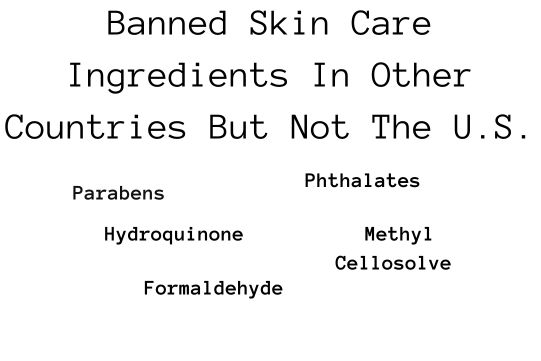What 5 Banned Ingredients Are Found In Skin Care Products?
 Banned Ingredients? It’s bad enough that your melanin rich skin is confronted with challenges to keep it looking healthy and radiant.
Banned Ingredients? It’s bad enough that your melanin rich skin is confronted with challenges to keep it looking healthy and radiant.
Now you find out that ingredients that are banned in other countries, are plentiful in a lot of your skin care products.
There are a number of ingredients that have been banned in other countries due to their harmful effects on human health. However, some of these ingredients still make their way into skin care products in the United States. In this article, we will discuss:
5 Common Ingredients Found in Skin Care Products and Banned In Other Countries
- ol]:!pt-0 [&>ol]:!pb-0 [&>ul]:!pt-0 [&>ul]:!pb-0″ value=”1″>Parabens
Parabens are preservatives commonly used in cosmetic and skin care products to prevent the growth of harmful bacteria. However, parabens have been linked to hormone disruption and studies have shown that they can mimic estrogen in your body. This can lead to reproductive issues, as well as an increased risk of breast cancer.
In 2004, Denmark banned the use of propylparaben and butylparaben in cosmetic products for children under the age of 3. In 2012, the European Union banned five types of parabens from use in cosmetics. Yet, in the United States, parabens can still be found in a wide range of personal care products.
To avoid these harmful ingredients, look for products labeled “paraben-free” or check the ingredient list for paraben variations such as methylparaben and ethylparaben.
- ol]:!pt-0 [&>ol]:!pb-0 [&>ul]:!pt-0 [&>ul]:!pb-0″ value=”2″>Hydroquinone
Hydroquinone is a skin lightening agent commonly found in products marketed towards individuals with hyperpigmentation issues. However, studies have shown that this ingredient can cause damage to your skin cells. This can lead to irritation, redness, and a higher risk of skin cancer.
In 2006, the European Union banned the use of hydroquinone in cosmetic products due to concerns about its safety. Yet, in the United States, it is still allowed in concentrations up to 2%. This means that even though it may be effective for lightening dark spots on your skin, long-term use can have serious consequences.
To avoid this ingredient, opt for natural alternatives such as vitamin C, essential oils or kojic acid to help with hyperpigmentation.
There’s more …
- ol]:!pt-0 [&>ol]:!pb-0 [&>ul]:!pt-0 [&>ul]:!pb-0″ value=”3″>Phthalates
Phthalates are a group of chemicals commonly used in plastic and cosmetic products to increase their flexibility and longevity. However, they have been linked to reproductive issues, developmental problems, and an increased risk of breast cancer.
In 2003, the European Union banned two types of phthalates from use in cosmetic products. In 2008, the United States followed suit and also banned these chemicals from use in children’s toys.
However, they are still commonly found in personal care products such as perfumes, lotions, and hair sprays.
To avoid phthalates, look for products labeled “phthalate-free” or opt for natural alternatives.
- ol]:!pt-0 [&>ol]:!pb-0 [&>ul]:!pt-0 [&>ul]:!pb-0″ value=”4″>Methyl Cellosolve
Methyl Cellosolve, also known as 2-methoxyethanol, is a solvent commonly used in skincare products to help ingredients penetrate deeper into the skin. However, this ingredient has been linked to reproductive and developmental toxicity, leading to its ban or strict regulation in many countries.
Although Methyl Cellosolve is not often listed on labels, it’s used as a skin lightener.
- ol]:!pt-0 [&>ol]:!pb-0 [&>ul]:!pt-0 [&>ul]:!pb-0″ value=”5″>Formaldehyde
Formaldehyde is a known carcinogen that is often used in nail polishes and hair straightening treatments. It’s also commonly found in personal care products as a preservative. Exposure to formaldehyde has been linked to cancer, respiratory issues and skin irritations.
In 2011, the European Union banned the use of formaldehyde in cosmetic products. However, it is still allowed in certain concentrations in the United States.
To avoid this ingredient, look for products labeled “formaldehyde-free” or opt for natural preservatives such as essential oils.
Opt for Natural And Organic Products
It’s important for you to become more aware of the harmful ingredients that can be found in skin care products. Read labels and do research before making a purchase.
Opting for natural and organic products can help reduce exposure to these banned ingredients and promote healthier skin. Remember, your melanin rich skin deserves the best care possible, so be mindful of what you put on it.
Summing Things Up …
The use of banned ingredients in skin care products is a serious issue that needs to be addressed. It’s important for you to become more aware of the harmful effects these ingredients can have on your health and to take steps towards avoiding them.
By reading labels and opting for natural alternatives, we can all promote healthier skin and contribute to a safer beauty industry.
Continue to educate yourselves and make informed decisions when it comes to your skin care routine. Your melanin rich skin deserves the best. So, stay informed and choose wisely!
That’s it for this week. As always …
Dedicated To Your Skin,
Juliette Samuel,
Esthetician/Author/Publisher,
The post What 5 Banned Ingredients Are Found In Skin Care Products? appeared first on Black Skin Care – Natural Hair Care – African American Skin Care.

